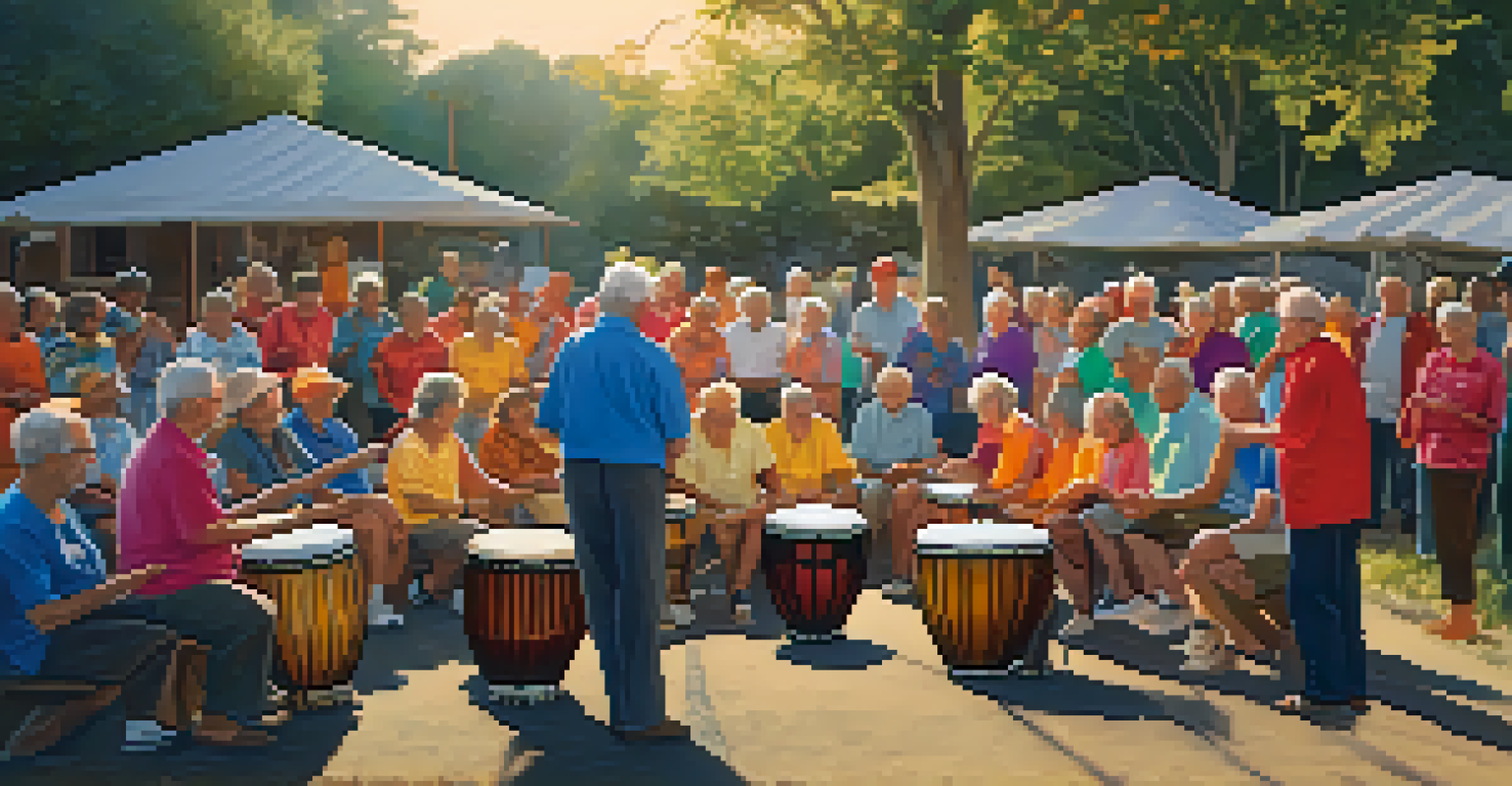Enhancing Emotional Well-being Through Music for Seniors

Understanding the Connection Between Music and Emotions
Music has a profound ability to evoke emotions, making it a powerful tool for enhancing emotional well-being. For seniors, engaging with music can trigger memories and feelings that may have been dormant, bringing joy and comfort. This connection is often rooted in personal experiences, as specific songs can transport listeners back to significant moments in their lives.
Music can change the world because it can change people.
Research shows that listening to music can stimulate brain regions related to emotion and memory. For seniors, this means that familiar tunes can help improve mood and reduce feelings of anxiety and depression. The emotional response to music can be a shared experience, fostering connections with others when enjoyed in a group setting.
Furthermore, music therapy has been shown to help seniors cope with various challenges, including loneliness and cognitive decline. By tapping into the emotional power of music, seniors can find a sense of belonging and purpose, enhancing their overall quality of life.
The Role of Music in Memory Recall and Nostalgia
Nostalgia plays a significant role in emotional well-being for seniors, and music is one of the most effective triggers for this feeling. Listening to songs from one’s youth can evoke vivid memories and emotions, creating a sense of connection to the past. This can be particularly beneficial for seniors dealing with memory-related issues, as it helps anchor them in their personal history.

Engaging with nostalgic music can also spark conversations among seniors, promoting social interaction and reducing feelings of isolation. Sharing stories associated with certain songs can strengthen bonds and encourage a sense of community. For families, playing music that resonates with their loved ones can be a meaningful way to connect and reminisce.
Music Enhances Seniors' Emotions
Engaging with music can evoke positive emotions and memories in seniors, improving their overall emotional well-being.
Additionally, creating personalized playlists filled with beloved tracks can enhance daily routines, making mundane tasks feel more enjoyable. This simple act can foster a positive mindset, reminding seniors of cherished moments and the joy that music brings to their lives.
Music as a Tool for Stress Reduction and Relaxation
For many seniors, daily life can bring about stress and anxiety. Music serves as a natural relaxant, with soothing melodies promoting calmness and reducing tension. Listening to soft, instrumental music can provide a peaceful backdrop for activities like reading or meditating, creating a serene environment.
The music is a reflection of our life. It’s a way to express who we are and what we feel.
Research indicates that listening to calming music can lower heart rates and cortisol levels, leading to decreased stress. This is especially important for seniors, who may be more susceptible to the negative effects of stress on their health. Incorporating music into relaxation techniques can be an effective strategy for maintaining emotional balance.
Moreover, participating in music-based activities, such as singing or playing an instrument, can be a joyful way to alleviate stress. These activities not only engage the mind but also promote physical movement, which is vital for overall well-being. By embracing music as a stress-reduction tool, seniors can cultivate a more peaceful and fulfilling lifestyle.
Creating Opportunities for Musical Engagement
Encouraging musical engagement is key to enhancing emotional well-being among seniors. This can be achieved through various avenues, such as community music programs, sing-alongs, or even casual jam sessions. These opportunities provide a platform for seniors to share their love of music and connect with others who share similar interests.
Establishing a routine that includes musical activities can also foster a sense of anticipation and excitement. Whether it's attending a concert, participating in group drumming, or simply enjoying a favorite album at home, these experiences can significantly enrich seniors' emotional lives. They not only provide joy but also create lasting memories.
Nostalgia Strengthens Connections
Listening to familiar songs can spark nostalgia, fostering social interaction and deeper connections among seniors.
Family members can play an essential role in facilitating these musical experiences. By introducing seniors to new genres or artists, they can help broaden their musical horizons and keep their passion for music alive. This connection between family and music can strengthen relationships and enhance emotional support.
The Benefits of Group Music Activities for Seniors
Group music activities, such as choir singing or drumming circles, offer numerous emotional benefits for seniors. These gatherings create a sense of belonging and community, which is vital for combating loneliness and isolation. Participating in music with others fosters a shared experience that can lead to deeper connections among participants.
Moreover, the act of making music together promotes teamwork and collaboration, enhancing social skills and emotional intelligence. Seniors can express themselves creatively in a supportive environment, which can boost self-esteem and confidence. The joy of creating something together can be incredibly fulfilling and uplifting.
Research has shown that group music activities can improve mental health outcomes, contributing to lower levels of anxiety and depression. By engaging in these communal experiences, seniors can build meaningful relationships while reaping the emotional rewards that come from collective musical expression.
Incorporating Music into Daily Routines for Seniors
Integrating music into daily routines can significantly enhance the lives of seniors. Simple practices, such as playing music during breakfast or while doing chores, can create a more enjoyable atmosphere. This small change can have a substantial impact on mood and motivation throughout the day.
Setting aside time for listening to music or participating in musical activities can also provide structure and purpose. Whether it's a weekly dance class or a regular listening session, these activities can help seniors maintain a sense of normalcy and joy in their lives. The routine can become something to look forward to, brightening their days.
Group Activities Promote Well-Being
Participating in group music activities creates a sense of community, reducing loneliness and enhancing mental health for seniors.
Additionally, families can encourage seniors to explore new music through streaming services or local music events. This exploration can open up new avenues for interest and connection, enriching their lives with fresh sounds and experiences. By making music a core part of daily life, seniors can truly enhance their emotional well-being.
The Future of Music Therapy in Senior Care
As the understanding of music's benefits for emotional well-being continues to grow, the future of music therapy in senior care looks promising. Many healthcare facilities are beginning to incorporate music therapy programs, recognizing the positive effects on mood and cognitive function. This trend is paving the way for more comprehensive approaches to senior care.
Advancements in technology are also enabling new ways for seniors to engage with music. From virtual concerts to interactive music apps, these innovations are making it easier for seniors to access and enjoy music in their homes. This increased accessibility can lead to greater emotional benefits and a more connected experience.

Ultimately, the integration of music into senior care highlights the importance of emotional well-being in overall health. As we continue to embrace the healing power of music, seniors can look forward to a future filled with joy, connection, and enriched lives.